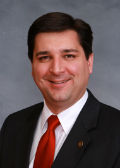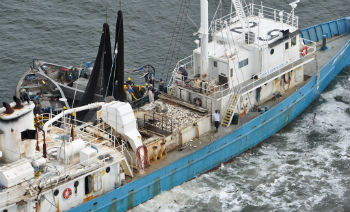Coastal Review Online will post a roundup of coastal legislative news every Friday while the N.C. General Assembly is in session.
RALEIGH — Unfazed by a heavy barrage of worldwide criticism and outright ridicule by sources ranging from Scientific American to the “Colbert Report,” the N.C. Senate’s Agriculture, Environment and Natural Resources Committee yesterday approved a new version of a bill that restricts the use of scientific modeling in state and local public policy and regulations to predict future sea-level rise.
Supporter Spotlight
Although the new version dials back some of the language from a previous version aimed at how sea-level rise is to be determined, the bill would still prohibit any “rule, ordinance, policy, or planning guideline that defines sea level or a rate of sea-level rise within a coastal-area county” which falls outside of an official state rate of rise
Under the legislation, determining that rate falls to the Coastal Resources Commission, which is restricted in the bill from using accelerated sea-level rise models if they are not “consistent with historical trends.”
At the committee hearing, bill sponsor Sen. David Rouzer, R-Johnston, said there is no scientific consensus about the rate of sea-level rise and that a state science panel’s recommendation on a rise of one meter by 2100 did not take into consideration that rates were different for different parts of the coast.
 Sen. David Rouzer |
 Sen. Harry Brown |
He said regulations based on accelerated sea-level rise would have a huge negative effect on the coastal economy and that the new legislation was intended to put “guardrails in place” in developing sea-level rise projection.
“Science should be based on real hard data,” said Rouzer, who presented the bill. “Just because there is a group of folks that project the sea-level rise does not mean the sea will rise. There was consensus years and years and years ago that the earth was flat; turned out to be round.”
Supporter Spotlight
Sen. Harry Brown, R-Onslow, defended the bill, saying it’s a reaction to the rapid increase of environmental regulations on the coast. “It’s just time we slowed this stuff down and take a look at it,” he said. “It’s got to make some common sense.”
Rob Jackson, a Duke University professor who specializes in global environmental change, was the lone dissenting voice. He told the committee they were moving counter to the broad scientific consensus about sea-level rise.
“It’s already clear to the scientific community that the rates of sea-level rise are accelerating,” Jackson said. “We know why they’re rising because of warmer temperatures and ice melting. This bill basically says we can’t use the best scientific information to protect people along the coast of North Carolina.”
Legislators are wading into a debate that has been going on for two years as the state’s Coastal Resources Commission grappled with planning for sea-level rise. In 2010, the commission’s science panel recommended that the state prepare for a sea-level rise of up to 55 inches by 2100, with a 39-inch rise being likely. That recommendation drew fire from coastal developers and some coastal counties. They pushed the commission to consider only the rate that the ocean has risen in the last 100 years. Extrapolated to 2100, that would be about 8 inches.
Though the science panel reaffirmed its findings in April, the commission is in the process of writing a policy on sea-level rise that won’t contain the panel’s forecast or policy recommendations.
In a statement sent to the Senate committee on Wednesday, four of the scientists who served on the panel said the new version of the bill still has major problems. Geologists Rob Young and Steve Benton at Western Carolina University and David Mallinson and Stan Riggs at East Carolina University said the bill contradicts the overwhelming scientific consensus that sea-level rise will happen faster in the next 100 years than it has in the past and ties the hands of localities that would like to plan pro-actively for these changes.
 Rob Jackson |
They also questioned the method for determining sea-level rise in the bill. “The source of this methodology is unclear, but it does not come from the State’s own expert panels,” they wrote. “The methodology has not been vetted or peer-reviewed in any transparent fashion. In our opinion, it is not scientifically valid, nor useful for understanding the changes that may challenge the economic vitality of the coastal region in the future.”
But the new version did win tentative support from the League of Municipalities thanks to the addition of a section allowing local governments to use accelerated projections for non-regulatory purposes. Erin Wynia, policy analyst with the league, said the language allows the cities flexibility in protecting public infrastructure, which was a major concern of some coastal cities.
The bill now goes to the full Senate for consideration, where Todd Miller hopes rationality prevails.
“Today wasn’t a good one for North Carolina,” the N.C. Coastal Federation’s executive director wrote in his blog. “It was the day when our elected leaders decided to turn their backs on the state’s long and proud history as a leader in research, technological achievement and marine sciences. It was a day they took us backwards, to a time when science was suspect and unfounded beliefs held firm.”
Bill Ends Factory Fishing for Menhaden
 An Omega Protein vessel fishes for menhaden. |
North Carolina and Virginia are the last two states on the Atlantic coast that allow large-scale purse-seine fishing for menhaden, a key bait and industrial fish that researchers say plays an important role in maintaining healthy coastal waters.
But a new bill, sponsored by Sen. Harry Brown, R-Onslow, would eliminate the practice in North Carolina and with that the half-dozen trips into state waters by boats from Omega Protein, a Reedsville, Va., based company that is the only enterprise using the methods described in the legislation.
Last month, the state’s Marine Fisheries Commission voted to ban the practice, a move that Omega and others have mounted a legal challenged to stop.
In a hearing on the bill Thursday, Al Dudley, a Carteret County fisherman, told the Senate Agriculture, Environment and Natural Resources Committee that he and other North Carolina fishermen depend on the work from Omega Protein. He asked that the company be allowed at least a short six week season in the late fall.
Southport Sen. Bill Rabon, said the menhaden fishery is critical because of the fish’s impact on estuaries and other coastal waters. He said it was time to end purse seine fishing because the species is being overfished to the point where it might not come back.
“It’s an industry that’s killing itself,” Rabon said. “We can save the fish and save the estuaries or watch the estuaries die slowly with it.”
Senate Still Working on Budget
Lawmakers wrapped up work this week with the Senate yet to unveil its tweaks to the budget the N.C. House passed last week.
Senate leaders say they have been at work on their version of the budget bill and expect to take up the legislation next week. The bill is expected to be heard in the full Senate Appropriations and Finance committees next Tuesday with floor votes to follow. Once the Senate votes on its version of adjustments to the state’s biennial budget, House and Senate negotiators can begin work on a final version.







